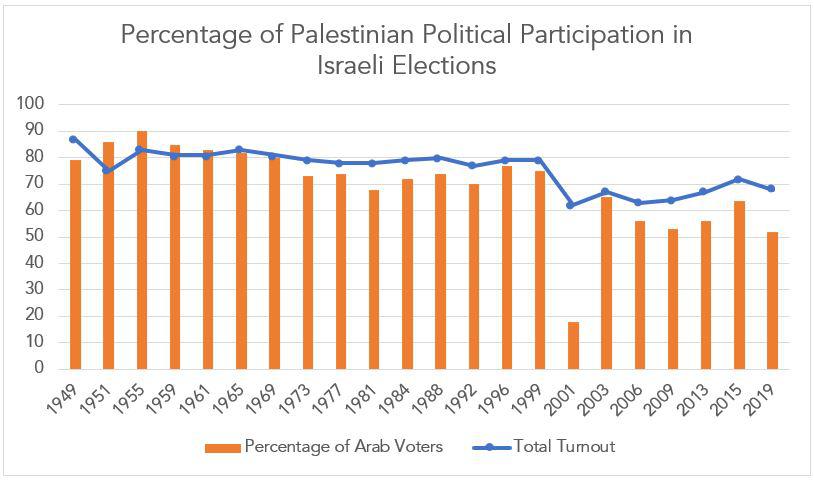
The elections on April 9th resulted in an extreme right-wing majority for the 21st session of the 120 member Knesset. Benjamin Netanyahu, of the Likud party, has been presented as the party candidate to become Prime Minister. The party candidate must gather a 61 seat majority in the Knesset by forming alliances with other groups elected to the legislature, thus forming a coalition government. Currently, the elected members of Knesset from the extreme right-wing parties of Likud (35), Shas (8), United Torah Judaism (8), Yisrael Beytenu (5), Union of the Right-wing Party (5), and Kulanu (4) total 65 seats. The Kulanu, Shas, and United Torah Judaism parties have already expressed their support for Netanyahu. The election results have proven that the trend of identity voting in Israel since the 1977 election continues to be strong.
On Tuesday April 9th, 2019, the election exit polls showed contentious, close results from the early morning until late at night. This morning it became clear that the Likud and Blue & White parties tied for 35 seats in the 21st Israeli Knesset. 29% of Jews in Israel voted for the Likud party.
The low voter turnout from Palestinian Arab citizens of Israel reflects the frustations of Palestinians with the discriminatory Jewish “democracy” of Israel, and with the dissolution of the Arab Joint List. As a result, 52% of eligible Palestinian Arab citizens voted on Tuesday, compared to 64% voting in the 2015 elections. One of the two parties representing the Arab community, Hadash-Ta’al, won 6 seats, with candidates Ayman Odeh, Ahmad Tibi, Aida Touma-Sliman, Osama Saadi, Ofer Cassif, and Yousef Jabareen entering the Knesset. The other party representing the Arab community, Balad-United Arab List, won 4 seats, with candidates Mansour Abbas, Mtanes Shehadeh, Abd al-Hakim Hajj Yahya, and Heba Yazbak. Additionally, Arab candidates will join the Knesset from other parties, Meretz (1), Kahol Lavan (1) and Likud (1).
The Arab members of Knesset are a key political group, an extension of the political power that the entire Palestinian ciitzen community could yield in Israel. This year, after 70 years of discrimination, and in light of extreme, vocal prejudice against Arabs from the candidates running for election, many Palestinian citizens boycotted the Israeli elections. The Mossawa Center believes that the civic engagement of the Palestinian citizens of Israel is one key aspect of a multi-varied approach towards actual negotiations for peace, where Palestinians have a free and equal voice.
As a result of the growing disillusion of the Arab population that is eligible to vote, the elected Members of Knesset must work harder in the 21st Knesset to create government based, socioeconomic solutions that will benefit the impoverished Arab localities and citizens.
Currently, as the elected ruling party, the Likud party, known for their policies of maintaining second-class citizenship for the Palestinian Arab citizens of Israel, creating Jewish settlements in occupied Palestinian terrorities of the 1967 agreements, continued occupation of Palestinian lands, and opposition to independent Palestinian statehood, presented their candidate, Benjamin Netanyahu, for the position of Prime Minister. Netanyahu now must command a majority in the Knesset to be inaugurated by the end of April. The potential Prime Minister, Netanyahu, ran on a campaign full of hateful rhetoric and promises to annex the West Bank if able to become Prime Minister for the 5th term. Attorney General Mandelbilt has brought up charges against Netanyahu for corruption and bribery prior to the election, and has announced the trial will be held later this year.
This formed coalition government represents the growing facist trend in Israeli politics. By directly targeting minority citizens of Israel, threatening the lives of Arab politicians individually, threatening the collective rights of the Arab community, the Israeli government maintains power in an “us” vs “them” mentality. Instead of this divisive tactic to demonize the Palestinian people, the Israeli political community should stop fearing the polticial power of Arabs in Israel and should instead work to involve them in the decision-making process. A strong 22% minority, 93% of the Palestinian citizens are under the age of 55. As an important part of the future of this state’s economy, Palestinian citizens would be a tremendous asset to an open minded Jewish parties.









